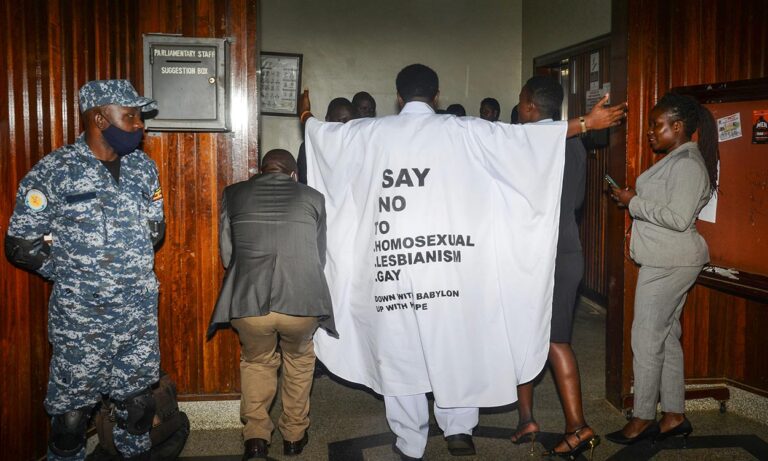An inside look into the oppressive Uganda 2023 Anti-Homosexuality Bill and its devastating impact

On Tuesday 21 March 2023, MPs in Uganda passed a new bill that makes identifying as LGBTQIA+ illegal and punishable by life imprisonment. It also states that, for the first time, friends, family and members of the community would have a duty to report individuals in same-sex relationships to the authorities.
The 2023 Anti-Homosexuality Bill is one of the toughest pieces of anti-gay legislation in Africa, and while homosexual acts were already illegal in Uganda, this latest bill introduces many new criminal offences and potential punishments.
Although the final version of the legislation has yet to be officially published, according to the BBC, elements including the death penalty for “aggravated homosexuality,” property owners facing imprisonment for using their premises as a “brothel,” and potential prosecution and imprisonment for journalists broadcasting, distributing and publishing any content that “promotes homosexuality” are currently all being discussed in parliament.
Fox Odoi-Oywelowo, a longtime member of Uganda’s ruling party and President Yoweri Museveni’s legal adviser for more than 15 years, was one of the only two MPs who voted against the controversial bill. In an exclusive interview, Odoi-Oywelowo shared his reasoning with openDemocracy. “You cannot claim to be a human being if you do not respect human rights,” the politician stated.
“Homophobia has never been part of traditional African societies. Perhaps they had a lack of understanding but they let them live in peace,” he added. According to Odoi-Oywelowo, one of the bill’s objectives was to protect the “traditional,” “moral” and “religious” values of Uganda.
Instead, what this now shows is that there is only one set of religious values being upheld despite the fact that the country is host to individuals who hold a number of faiths, including Muslims, Hindus, Sikhs and Pagans. Some members of the LGBTQIA+ community have accused Christian fundamentalism as the root of the draconian new bill.
A week before the bill passed through parliament, the Guardian revealed that human rights groups had recorded a surge in attacks on LGBTQIA+ Ugandans, adding that the nation had become an increasingly hostile environment. Transgender people were said to have been disproportionately affected.
Cleopatra Kambugu is a Ugandan activist who advocates for sexual and gender minorities. In 2021, she made history as the first transgender person in the country to have their gender officially recognised by the government.
SCREENSHOT spoke with Kambugu five days before the Anti-Homosexuality Bill had been passed. At the time, the activist described how the manner in which the bill was being debated was harmful. “The whole discourse around it showed no interest in being objective. The government’s position was evident and in doing so, it creates an atmosphere that makes people feel emboldened to act on their feelings about people who are LGBTQI+,” she said.
This is not the first time Kambugu has been on the receiving end of homophobic comments. In 2016, she was the subject of a film titled The Pearl of Africa which captured “a story of love, hate and being transgender.” Later on, when the Ugandan government passed its Anti-Homosexuality Act in 2013, prohibiting same-sex relations, the activist was outed by a tabloid newspaper, which then resulted in her having to flee to neighbouring Kenya for safety.
“The language of nature versus nurture is used to disqualify people like me,” she explained, “however for us [as a country] this is a good starting point to start approaching this ancient conversation. For Uganda, this is very progressive, we’re moving the debate from ‘let’s kill them and imprison them’ to ‘let’s figure out how this arises’.”
Kambugu is referring to the parliamentary debates and commentary made by Dr Sylvia Tamale, a retired law professor, who recently contested the bill. Speaking before parliament, Tamale advocated for the bill to be scrapped and not given the “light of day.”
“The discussion of imprisonment, and even the death penalty, makes it seem like being queer is the worst thing,” Kambugu concluded. After the bill passed, SCREENSHOT reached out to Kambugu once more for an updated commentary but has yet to hear back.
Tigere Chagutah, Amnesty International’s Director for East and Southern Africa, has described the legislation as “deeply repressive” and called for President Museveni to urgently veto the decision.
Moreover, Labour MP Charlotte Nichols has urged the UK to put pressure on the Ugandan government to reverse the decision, as well as ensure safe and legal routes for Ugandans who need to leave the country to access asylum support, as reported by PinkNews.
Speaking to openDemocracy, the aforementioned former advisor to the President, Odoi-Oywelowo, shared that he expected everyone to protect the rights of his children, and that therefore voting against the bill was simply his duty.
To date, same-sex relations are banned in more than 30 African countries.




